CRU aluminum: US announces tariffs, China eyes property recovery
President Biden announced an increase in tariffs this week on Chinese EVs, semiconductors, batteries, solar cells, steel, and aluminum.
President Biden announced an increase in tariffs this week on Chinese EVs, semiconductors, batteries, solar cells, steel, and aluminum.
The recent decline in US hot-rolled (HR) coil and longs prices has further restricted demand for imported material. Despite the decline in US sheet prices, CR coil and HDG imports remain attractive. While demand for imports of longs products has been limited, buyers have increased imports of wire products to avoid wire rods’ higher tariffs. […]
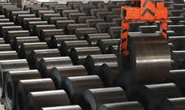
US hot-rolled (HR) coil prices saw further declines this week, while foreign prices were steady to slightly higher in the three regions we monitor
Our spot price is little changed this week after moving sharply lower last week on the heels of Nucor’s unexpected price cut. Here’s one thought on that trend: Nucor's weekly HR price (aka, its “Consumer Spot Price” or CSP) has to date functioned almost more like a monthly price.
The China Iron and Steel Association (Cisa) has urged steel producers to cut back on record high inventories while the sector struggles with oversupply.
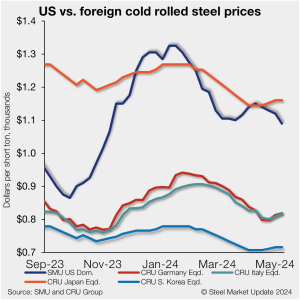
Offshore cold-rolled (CR) coil prices remain much less expensive than domestic product, even as domestic prices have slipped to a six-month low, according to SMU’s latest check of the market.
The Mexican federal government backed down on the application of tariffs on raw non-alloyed and alloyed aluminum decreed on April 22.
Japanese steelmaker JFE Holdings will invest abroad as part of a drive to lift income, says group president Yoshihisa Kitano.

CRU Senior Analyst Ryan McKinley will be the featured speaker on the next SMU Community Chat on Wednesday, May 15, at 11 am ET. You can register here. Note that the live webinar is free for all to attend. A recording will be available only to SMU members.
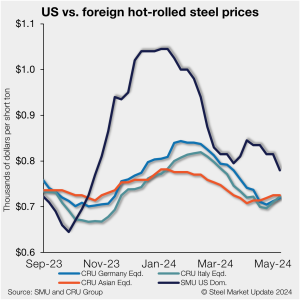
US hot-rolled (HR) coil prices declined again, tightening their premium over offshore hot band, and moving closer to parity.
Brazil-based Gerdau has announced it will carry out a feasibility study into the greenfield development of a 600,000 metric-ton-per-year (mt) special steel plant in Mexico.
Unless you've been under a rock, you know by know that Nucor's published HR price for this week is $760 per short ton, down $65/st from the company’s $825/st a week ago. I could use more colorful words. But I think it’s safe to say that most of the market was not expecting this. For starters, US sheet mills never announce price decreases. (OK, not never. It has come to my attention that Severstal North America rescinded a price increase back on Feb. 14, 2012. And it caused quite the ruckus.)
Turkish scrap import prices were stable last week. CRU’s assessment for HMS1/2 80:20 and shredded was unchanged at $384 per metric ton (mt) CFR and $408/mt, respectively.
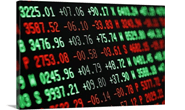
When we were asked to provide some additional commentary to SMU about the futures markets for flat rolled, our only reluctance to contribute was rooted merely in the fact that SMU (1) already offers an excellent array of authors on this topic and (2) a concern regarding what new ground could be covered that hasn’t already been discussed to death on this issue. Thankfully, however, Nucor has offered up something we can describe, without hyperbole, as simply revolutionary for spot pricing in flat rolled - a development that we simply could not resist commenting on with respect to its probable impacts on the futures market.

CRU principal analyst Ryan McKinley will be the featured speaker on the next SMU Community Chat on Wednesday, May 15, at 11 am ET. McKinley is instrumental in determining CRU’s benchmark hot-rolled (HR) coil price. He’ll discuss his role, his background in steel, and how the index works.
US announces new import duties on aluminum extrusions The US Department of Commerce has placed preliminary antidumping (AD) duties of 2-600% on imports of aluminum extrusions from 14 countries. The rates are: “[The findings] show just how widespread dumping practices are globally and highlight the importance of strongly enforcing the antidumping laws to shield US […]
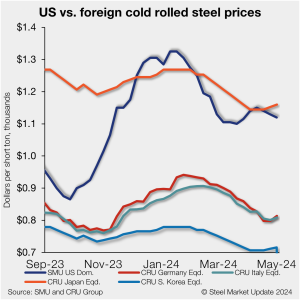
Foreign cold-rolled (CR) coil remains much less expensive than domestic product even as domestic prices continue to decline, according to SMU’s latest check of the market.
Brazil’s chamber of foreign trade, Camex, has approved quotas on imports of 11 steel products and a 25% levy on shipments 30% above a product’s average import volume between 2020 and 2022.
Hybar has big plans for entering the American steel market. Although it is the newest player in the US rebar market, the startup is led by an experienced, nimble, and ambitious team, and backed by investors with deep pockets. Industry titan and Hybar CEO David Stickler joined SMU Managing Editor Michael Cowden on Wednesday’s Community Chat to update the SMU community on the company’s first mill, and its grand plans for the future.
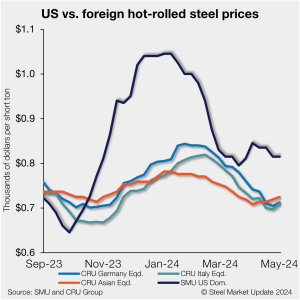
US hot-rolled (HR) coil price premium over offshore hot band has tightened on the back of lower domestic tags, though stateside HR coil remains markedly more expensive than imports.
Latest AA extrusion shipment report shows persistently weak demand The US Aluminum Association released its latest shipment report for extruded products. According to the report, shipments in March 2024 totaled 383.2 million pounds, representing a drop of 10.6% y/y but a rise of 4.5% m/m. For the YTD period through March, total shipments are now […]
What a difference a month makes. In late March, it seemed like the US hot-rolled (HR) coil market was poised to cycle upward. Large buyers had re-entered the market and placed big orders earlier in the month. Several outages were underway or upcoming. And expectations were that lead times would continue to extend. Cliffs said […]
Constellium reported its latest quarterly results for Q1'24. Adjusted Ebitda came in at €137 million (USD$147 million), down 8.6% year over year (y/y) amid revenue of €1.7 billion (USD$1.8 billion), down 12% y/y. Shipments totalled 380,000 metric tons (mt) in Q1, representing a drop of 2% y/y.
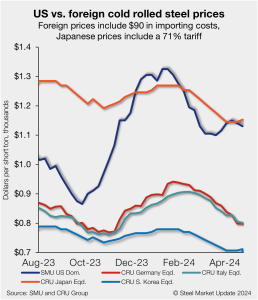
Foreign cold-rolled (CR) coil remains much less expensive than domestic product, according to SMU’s latest check of the market.
If successful in its overtures to Anglo American, BHP will create the world’s largest diversified miner by a country mile. The rationale for this merger is scale and in mining, size matters.

Week-over-week trading activity in US steel derivatives markets was relatively muted, with prices maintaining their downward direction since the beginning of the month. Bids have materialized at the lower end of this range in the May, as the nearby backwardation continues to roll on - just as we saw with April being a premium over May.
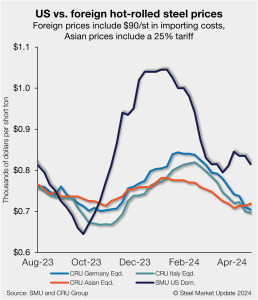
US hot-rolled (HR) coil remains more expensive than offshore hot band, though with a tighter premium as prices stateside and abroad have ticked lower in recent weeks.
Steel sheet prices in many regions of the world were steady week over week in the week ended April 17.
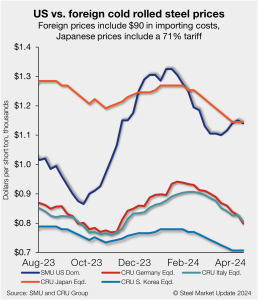
Foreign cold-rolled (CR) coil remains less expensive than domestic product, according to SMU’s latest check of the market.
Here’s a roundup of the latest news in the global aluminum market from our colleagues at CRU. Biden calls for tripling of Chinese steel and aluminum tariffs President Joe Biden is calling on the US Trade Representative (USTR) to consider increasing the existing section 301 import duty on Chinese steel and aluminum three-fold. The current […]